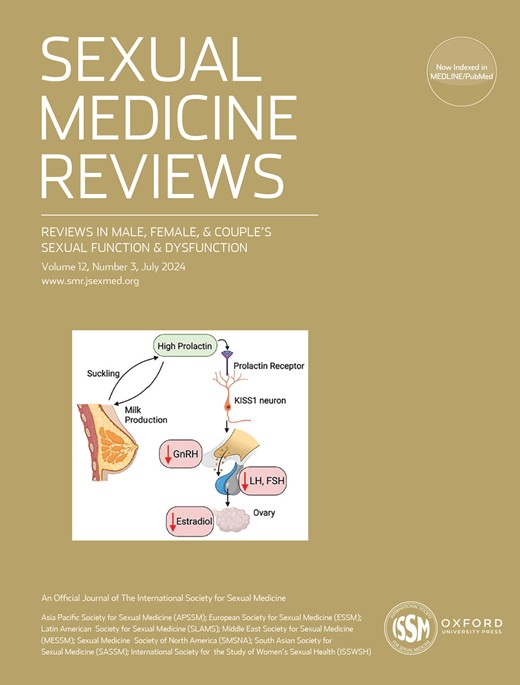
Testosterone replacement therapy in patients with cachexia: a contemporary review of the literature
AbstractIntroduction. Patients with long-term chronic illnesses frequently present with hypogonadism, which is primarily managed through exogenous testoste
Abstract
Introduction
Patients with long-term chronic illnesses frequently present with hypogonadism, which is primarily managed through exogenous testosterone. These same patients also experience a high degree of cachexia, a loss of skeletal muscle and adipose tissue.
Objective
To perform a contemporary review of the literature to assess the effectiveness of testosterone replacement therapy (TRT) for managing chronic disease–associated cachexia.Methods: We performed a PubMed literature search using MeSH terms to identify studies from 2000 to 2022 on TRT and the following cachexia related chronic medical diseases: cancer, COPD, HIV/AIDS, and liver cirrhosis.
Results
From the literature, 11 primary studies and 1 meta-analysis were selected. Among these studies, 3 evaluated TRT on cancer-associated cachexia, 3 on chronic obstructive pulmonary disease, 4 on HIV and AIDS, and 2 on liver cirrhosis. TRT showed mixed results favoring clinical improvement on each disease.
Conclusions
Cachexia is commonly observed in chronic disease states. Its occurrence with hypogonadism, alongside the shared symptoms of these 2 conditions, points toward the management of cachexia through the administration of exogenous testosterone. Robust data in the literature support the use of testosterone in increasing lean body mass, improving energy levels, and enhancing the quality of life for patients with chronic disease. However, the data are variable, and further studies are warranted on the long-term efficacy of TRT in patients with cachexia.
Introduction
Cachexia is a progressive metabolic wasting syndrome that accompanies and is related to long-term chronic diseases. Most notably it is present in up to 70% of advanced cancers and in 10% to 30% of patients with other chronic diseases, including chronic heart failure, chronic kidney disease, AIDS, and chronic obstructive pulmonary disease (COPD). Patients with cachexia experience significant unintended weight loss, muscle atrophy, weakness, and fatigue, causing a reduction in their quality of life.1-3 In patients with chronic diseases, weight loss is correlated with severity of other symptoms, worsening them and increasing overall mortality.4 The symptoms of cachexia, however, cannot be treated through nutritional supplementation, and nutritional interventions alone are not enough to restore patients’ lean body mass and weight.1,2 This has led to the need to identify alternative potential treatments for cachexia.
Cachexia in the context of cancer—termed cancer anorexia cachexia syndrome—has been well studied due to its prevalence in late-stage cases. Its pathophysiology is attributed to a mix of cytokine toxicities, long-term inflammation, and hormones.3,5 However, it has been suggested that androgen deficiency, or hypogonadism, is a key component of this process. Androgen disorders are present in the majority of men with metastatic cancers and are correlated more closely with patients also experiencing cachexic syndrome.6 Symptoms precipitated by these 2 disorders are similarly non specific and overlap: decreased energy, anorexia, sarcopenia, weight loss, fatigue, and weakness.5 It has thus been proposed that the addition of testosterone therapy in patients with cancer and cachexia, whether they are ostensibly exhibiting hypogonadism or not, could lead to improved outcomes and mortality. We seek to apply this principle one step further in the study of multiple chronic diseases in which hypogonadism has been concurrently observed with cachexia—specifically, cancer, COPD, HIV/AIDS, and liver cirrhosis.5,7-10
*Cancer
*Chronic Obstructive Pulmonary Disease
*HIV/AIDS
*Liver cirrhosis
Conclusion
Testosterone holds anti-inflammatory and anabolic properties that justify its application in the setting of chronic disease sarcopenia and cachexia when viewed from a molecular perspective. Given the limited available therapeutic options for cachexia treatment, TRT could be an important target for improving patients’ physical profiles and quality of life on an experimental level. The available body of literature has shown mixed results when different disease states are evaluated. The overall trend shows clinical improvement with or without statistical significance. Given the broad range of symptoms that a patient with cachexia may exhibit and the different courses of each disease entity, further systematic reviews and meta-analyses focusing on specific diseases may provide an answer to the applicability of TRT for cachexia in chronic disease states. Clinical reasoning and weighing the benefits of TRT against its inherent risks are also matters of debate when this form of therapy is administered to different patients.
Last edited by a moderator:












